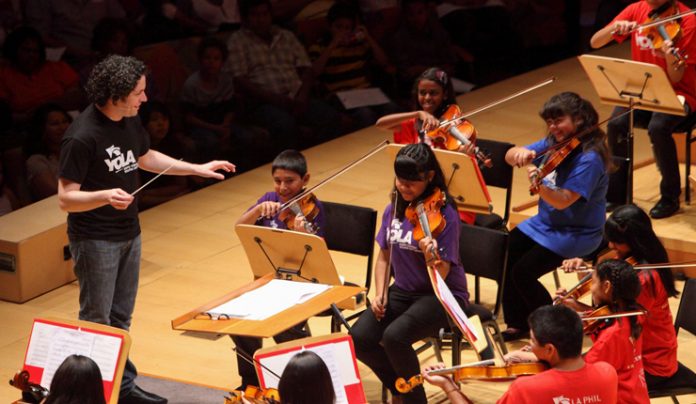
Science has shown that musical training can change brain structure and function for the better. It can also improve long-term memory and lead to better brain development for those who start at a young age. It stimulates the brain in a very powerful way because of our emotional connection with it. When children learn to play music, their brains begin to hear and process sounds that they couldn’t otherwise hear. This helps them develop “neurophysiological distinction” between certain sounds that can aid in literacy, which can translate into improved academic results for kids.
Music instruction appears to accelerate brain development in young children, particularly in the areas of the brain responsible for processing sound, language development, speech perception and reading skills, according to the initial results of a five-year study by USC neuroscientists.
Recent research underscores how playing an instrument (sooner than later) bolsters kids’ academic, social, and emotional lives.
Music has a power that’s practically immeasurable. It transcends time and language, expresses and influences our emotions, educates and entertains, and so much more. Scientists are also beginning to understand the impact music has on our brains. Essentially, the effect is massive and it has a particularly strong influence on the brains of children.
A 2015 study from the University of Queensland Australia suggests that the positive impact of engaging in informal music activities with your toddler is even greater than that of reading to him.
In a new study carried out at the University of Chile in Santiago, 40 children (aged 10 to 13) performed memory and attention tasks while their brain activity was monitored with functional MRI. This type of imaging scan detects small changes in blood flow within the brain.
Twenty of the children played an instrument, had completed at least two years of lessons, practiced at least two hours a week, and regularly played in an orchestra or ensemble.
The other 20 children had no musical training other than in the school curriculum.
The two groups had no differences in reaction time. But the musically trained children did better on the memory task, according to the report published online Oct. 8 in the journal Frontiers in Neuroscience.
And along with better memory recall, the musically trained kids had more activation in brain regions associated with attention control and auditory encoding — functions associated with improved reading, higher resilience, greater creativity, and a better quality of life.
The researchers’ next step is to dig into the mechanisms they found for improving attention and working memory. They also plan to study musical training with children and possibly to evaluate a musical training intervention for kids with attention-deficit/hyperactivity disorder, team leader Leonie Kausel said.
Dr Kausel recommends that parents should not only enroll their children because they expect that this will help them boost their cognitive functions but because it is also an activity that, even when very demanding, will provide them with joy and the possibility to learn a universal language.
Studies have shown the benefits of music to kids’ education and development happens primarily in the following areas:
Language processing
Multiple studies indicate that the brain processes music and language in similar ways and that music training benefits the development of a variety of language-related skills, from vocabulary building to phoneme processing. The Neurosciences Institute reports that its research has “revealed a significant degree of overlap between music and language processing,” and in a 2005 study, researchers at Stanford University found that mastering a musical instrument improves the way the human brain processes parts of spoken language. The findings suggested that students who are struggling with language and reading skills could especially benefit from musical training.
Memory
A study carried out by researchers at The Chinese University of Hong Kong found that children with musical training showed better verbal memory than their peers. “When these children were followed up after a year, those who had begun or continued music training demonstrated significant verbal memory improvement”, the study’s authors wrote. In other words, memorizing music pieces correlated with improvements in non-musical memory, too. The enhancement of working memory in young adults via music training was further validated in a 2018 study by researchers at York University.
Studies found out that musically trained children showed greater improvement on memory tests throughout the course of a year than their non-musically trained peers. This explains that playing music requires the brain to solve the problems of how to allocate attention and memory toward complex tasks
Math
Research has shown a link between music education and success in school maths. A study by The Royal Conservatory of Music in Canada concentrated on the effects of arts education on elementary school students and found that students in the arts program “scored significantly higher on mathematical tests of computation and estimation” than did students in a control group.
Self-Awareness
Music teaches children to “self assess,” rather than to rely on external rewards, explains Dr Frank Wilson, a neurologist and an authority on the relationship of hand use to human cognitive development. The precision and attention required to play an instrument — the instant feedback loop that requires you to adjust your own performance — encourages an “ongoing surveillance of yourself,” Wilson says. “It leads you to become a critic of your own work, to not be satisfied with anything less than achieving what it was you intended to do and hence fosters an internal motivation.”
Social skills
Benefits of playing music go beyond academic applications. “When you participate in music in a community or a school, you develop shared memories during musical activities, explains Takako Fujioka, of the Rotman Research Institute. It’s a bonding experience.” That bonding can also develop kids’ ability to work together. A recent study by researchers at Queens University of Charlotte, North Carolina, found that at-risk elementary school kids who had music instruction in an after-school program showed a significant decrease in behavior problems. Sharon Burch, an elementary school music teacher who developed the “Freddy the Frog” series of books and activities to teach the fundamentals of music to children, has also seen the effects of music on students’ social well-being. “I teach 450 kids per year,” she says, “and I notice that the kids involved in music are the most well-behaved, have the most confidence, and are doing well in their academic classes.”
Academic success
There is a strong correlation between music and general academic success. Studies have shown that students in music programs scored higher in English and math than students who had no music at all, and high school students with music training scored higher than their non-musical peers on the SAT, according to the College Board. A survey has also found that music majors, as a group, had the highest acceptance rate to medical school.
Long-term success
Students with music training tend to rank higher in common measures of long-term success such as educational attainment and income: a 2007 poll by Harris Interactive found that nearly nine out of ten people with post-graduate education had participated in music while in school, and 83 percent of those with incomes of $150,000 or more had had music education. The College Board’s 2006 study also found that high school students who participated in band or orchestra reported the lowest lifetime and current use of drugs and alcohol.






